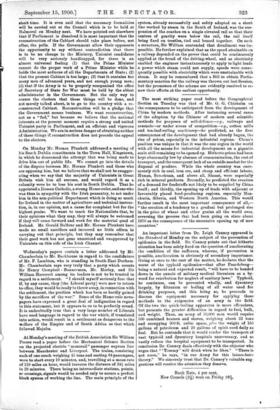The most striking paper read before the Geographical Section on
Tuesday was that of Mr. G. G. Chisholm on the consequences to be anticipated from the development of China by modern methods. After instancing several eases of the adoption by the Chinese of modern and scientific methods for purposes of self-defence—e.g., railways and arsenals—or under stress of competition—e.g., cotton mills and tea-leaf-rolling machinery—he predicted, as the first consequence of the development that bad already begun, the rise of prices, especially in the industrial regions. China's position was unique in that it was the one region in the world with all the means for industrial development on a gigantic scale still remaining to be opened up. Hitherto prices had been kept abnormally low by absence of communication, the cost of transport, and the consequent lack of an outside market for the disposal of produce. While the whole country was enor- mously rich in coal, iron ore, and cheap and efficient labour, Hunan, Szn-chuan, and above all, Shansi, were especially rich in mineral products. Secondly, be predicted the creation of a demand for foodstuffs not likely to be supplied by China itself ; and thirdly, the opening up of trade with adjacent or favourably placed food-producing regions, especially Man- churia, Siberia, and Western North America. This would further result in the most important consequence of all,- " the creation of a tendency to a gradual but prolonged rise in the price of wheat and other grains all the world over, reversing the process that had been going on since about 1870 as the consequence of the successive opening up of new countries."






































 Previous page
Previous page